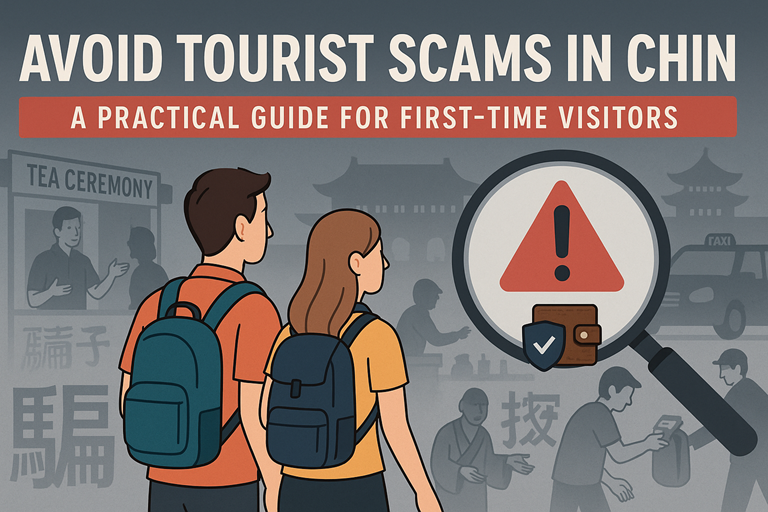Feeling Safe While Traveling in China
Practical Safety Advice for Foreign Visitors
China is, by and large, an exceptionally safe country for foreign tourists. Violent crime rates are remarkably low, especially against foreigners, and the visible presence of security personnel and extensive CCTV surveillance in urban areas often contributes to a general sense of security. However, like any travel destination, being aware of your surroundings and taking sensible precautions is key to ensuring a smooth, enjoyable, and trouble-free visit.

China’s cities are generally safe with extensive security infrastructure
This guide offers practical safety advice to help you navigate China with confidence.
Low Violent Crime: It’s worth reiterating: China is generally very safe. You are highly unlikely to encounter violent crime. The primary concerns are usually opportunistic petty theft and specific types of scams.
Situational Awareness: The most crucial piece of advice is to maintain situational awareness. Be mindful of who is around you and what’s happening, especially in crowded places.
Trust Your Instincts: If a situation or a person makes you feel uncomfortable, remove yourself from it. It’s better to be overly cautious than to regret not listening to your gut feeling.
Learn Basic Phrases: Knowing a few emergency phrases in Mandarin Chinese, or having them written down/on a translation app, can be invaluable.
- “Help!” – 救命! (Jiùmìng!)
- “Police” – 警察 (Jǐngchá)
- “I need a doctor” – 我需要医生 (Wǒ xūyào yīshēng)
Emergency Numbers
- Police: 110
- Ambulance: 120
- Fire: 119
Note: English-speaking operators may not always be available, especially outside major cities. Your hotel or a Chinese-speaking friend can assist in these situations.
While not rampant, pickpocketing and bag snatching can occur, particularly in:
- Crowded tourist attractions (e.g., Forbidden City, the Bund, Terracotta Warriors)
- Busy markets and shopping streets
- Packed public transport (subways, buses)
- Train stations and airport transit hubs

Be extra vigilant with belongings in crowded public transport
Practical Tips
Secure Your Valuables:
- Use a money belt or neck pouch worn under your clothing for passports, spare cash, and credit cards.
- Keep your wallet in a front pocket, not a back pocket.
- Use bags that can be zipped or securely fastened. Carry them in front of you in crowded areas, with the flap or zipper facing your body.
Don’t Flash Cash or Expensive Items: Avoid displaying large wads of money, expensive jewelry, or high-end electronics unnecessarily. This can make you a target.
Be Wary of Distractions: Pickpockets often work in teams. One might try to distract you (e.g., bumping into you, dropping something, asking for directions) while another attempts to steal your belongings. Be alert if such a situation arises.
Hotel Safes: Utilize the safe in your hotel room for passports (carry a copy with you), extra cash, and other valuables when you’re out.
At Restaurants/Cafes: Don’t leave your phone or wallet on the table unattended. Don’t hang your bag on the back of your chair, especially in busy outdoor seating areas; keep it on your lap or between your feet with a strap around your leg.
Taxis
- Licensed Taxis: Always use official, licensed taxis. These will have a meter and a taxi light on top. The driver’s license should be displayed.
- Avoid “Black Cabs” (黑车 – Hēichē): These are unlicensed taxis that often congregate around tourist spots, airports, and train stations. They are notorious for overcharging and can be less safe.
- Meter Usage: Insist the driver uses the meter (“打表 – Dǎbiǎo“). If they refuse or quote a flat, inflated fare, politely decline and find another taxi.
- Ride-Hailing Apps: Apps like DiDi (滴滴出行 – Dīdī Chūxíng) are very popular, generally safe, and often provide fare estimates and route tracking. You’ll typically need a Chinese mobile payment method or a linked international credit card.
- Have Destination in Chinese: Show your driver the destination written in Chinese characters (your hotel can help with this) to avoid confusion.

Always look for official licensed taxis with visible identification
Public Transport (Subway, Bus)
- Generally, it is very safe and efficient.
- Be mindful of your belongings during peak hours when trains and buses are packed.
- Hold on to railings, as stops and starts can be abrupt.
Trains
- China’s high-speed rail network is excellent.
- For overnight trains (especially hard sleepers), keep valuables secure and out of sight while you sleep. A small lock for your bag can be useful.
Pedestrian Safety
- Traffic can be chaotic, and pedestrian right-of-way is not always observed as strictly as in some Western countries.
- Always look carefully in all directions before crossing any road, even at designated pedestrian crossings or when you have a green light.
- Be aware of electric scooters and bicycles, which can be very quiet and appear unexpectedly.
Tap Water
Do not drink tap water in China. It is not generally potable.
- Use bottled water for drinking and brushing your teeth. Bottled water is widely available and inexpensive.
- Hotels usually provide complimentary bottled water or a kettle to boil water (boiled water is safe).
Ice
Be cautious with ice in drinks, especially from smaller establishments or street vendors, as it may be made from tap water. In reputable hotels and restaurants, ice is usually fine. If in doubt, ask for drinks without ice (不要冰 – Bú yào bīng).
Street Food
Trying street food is a fantastic part of the China experience.
- Choose vendors that are busy and popular with locals (a good sign of freshness and quality).
- Opt for food that is cooked fresh in front of you and served hot.
- If you have a sensitive stomach, introduce new foods gradually.
Restaurant Hygiene
Most restaurants are perfectly fine. Look for places that appear clean and well-maintained.
Fruit
Peel fruits yourself or wash them thoroughly with bottled water before eating if bought from markets.

Street food is delicious but choose busy vendors with fresh-cooked items
Travel Insurance: This is non-negotiable. Ensure you have comprehensive travel insurance that covers medical emergencies, evacuation, and hospitalization in China.
Prescription Medications: Bring an adequate supply of any prescription medications you need, along with a copy of your prescription and a doctor’s note explaining their necessity, ideally translated into Chinese. Keep medications in their original packaging.
Basic First-Aid Kit: Carry a small kit with essentials like pain relievers, antiseptic wipes, band-aids, anti-diarrheal medication, and any personal medications.
Vaccinations and Health Checks: Consult your doctor or a travel clinic well before your trip to discuss recommended vaccinations and any health concerns specific to travel in China.
Air Quality: Air pollution can be an issue in some major cities, particularly during certain times of the year. Check the Air Quality Index (AQI) daily. If you have respiratory issues, consider bringing or purchasing N95-rated masks.
Hospitals: Major cities have hospitals with “international wings” or VIP clinics that cater to foreigners and often have English-speaking staff. However, medical care can be expensive, and upfront payment is usually required (another reason for good travel insurance).
Medical Checklist
- Comprehensive travel insurance with medical coverage
- All prescription medications + copies of prescriptions
- Basic first-aid supplies
- N95 masks if sensitive to air pollution
- List of English-speaking hospitals in your destination
VPN (Virtual Private Network)
Many Western websites and apps (Google services, Facebook, Instagram, X/Twitter, WhatsApp, etc.) are blocked in China by the Great Firewall (GFW).
- Install a reputable VPN on ALL your devices before you arrive in China. It can be very difficult to download and install one once you are in the country.
- Choose a paid VPN service known to work reliably in China.

A working VPN is essential for accessing many Western websites
Public Wi-Fi
Be cautious when using public Wi-Fi networks (e.g., in cafes, airports). Avoid accessing sensitive information like online banking unless you are using a VPN.
Mobile Payments
Alipay and WeChat Pay are ubiquitous. While generally secure, ensure your phone has a strong passcode or biometric lock.
“Most travelers report that setting up mobile payments as a foreigner can be challenging without a Chinese bank account. Carry sufficient cash (RMB) as backup, especially when traveling outside major cities.”
Respect Local Laws and Customs
Familiarize yourself with basic Chinese laws and social etiquette. What might be acceptable in your home country could be offensive or illegal in China.
Drugs
Penalties for drug offenses in China are extremely severe, including the death penalty. Do not bring, buy, sell, or use illegal drugs.
Photography
- Avoid photographing military installations, government buildings, or police/security personnel unless you have explicit permission.
- Always ask for permission before taking close-up photos of people.
Alcohol
Consuming alcohol is legal and common. However, public drunkenness is frowned upon and can lead to problems. Drink responsibly.
Political Sensitivity
Avoid engaging in public political discussions, protests, or distributing religious or political materials. These can be highly sensitive topics.
Key Legal Reminders
- Always carry your passport (or a notarized copy)
- Register with your embassy if staying long-term
- Understand local censorship laws regarding internet use
- Be aware of restrictions on drones and photography
China is generally very safe for solo travelers, including women. However, standard solo travel precautions apply:

Solo travelers can feel safe but should take standard precautions
- Inform someone (e.g., hotel staff, a friend back home) of your general itinerary.
- Avoid walking alone in poorly lit or deserted areas late at night. Stick to well-trafficked streets.
- Be aware of your drink in bars and don’t leave it unattended.
- Trust your intuition. If a situation feels off, remove yourself.
- Consider joining group tours for certain activities if you prefer company.
- Use women-only train compartments when available on overnight trains.
“Many solo female travelers report feeling safer in China than in many Western cities, particularly regarding street harassment. However, cultural differences in personal space norms may lead to unintentional discomfort in crowded situations.”
Contact Your Embassy/Consulate
Keep the contact details and address of your country’s embassy or nearest consulate handy. They can assist in serious situations (e.g., lost passport, arrest, serious illness/accident).
Hotel Assistance
Your hotel staff can be a valuable resource for minor issues, helping with communication, or advising on local services.
Police Report
If you are a victim of theft, report it to the police (110) to get a police report, which you may need for your travel insurance claim.
Emergency Preparedness Checklist
- Embassy contact information saved in multiple places
- Photocopies of passport and important documents
- Emergency cash stash separate from main wallet
- List of emergency contacts (including at home)
- Know the address of your hotel in Chinese characters
The overwhelming majority of foreign visitors have a safe and incredibly rewarding experience in China. The purpose of this advice is not to cause alarm, but to empower you with awareness.

With proper preparation, China offers unforgettable travel experiences
By taking these common-sense precautions, you can significantly minimize risks and focus on enjoying the rich culture, history, and beauty that China has to offer. Stay alert, be respectful, and embrace the adventure!
“China’s combination of ancient wonders and modern marvels makes it one of the world’s most fascinating destinations. The warmth of its people and the efficiency of its infrastructure consistently surprise first-time visitors who may have arrived with preconceived concerns about safety.”
Enjoyed this article? Consider buying me a coffee to support more content like this!
💖 0 people have clicked to support this article.


